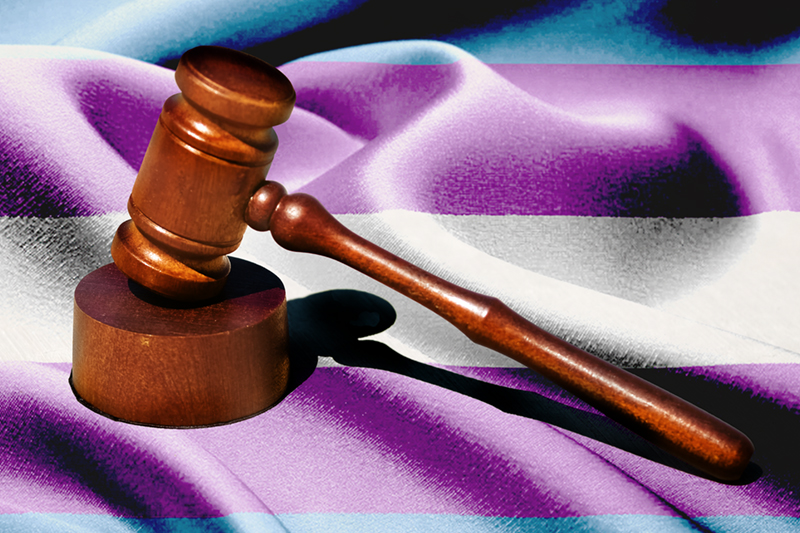American Medical Association recommends removing gender markers from public portions of birth certificates
Advocates argue eliminating sex designations will protect trans, nonbinary, and intersex people from discrimination.

The American Medical Association advocated in a June report for removing gender markers from the public portion of birth certificates, recommending that data on gender be made available for medical and statistical use only.
According to the report, removing a person’s sex designation from the public portion of birth certificates would have little to no impact on data collected for medical, public health, and statistical purposes.
While current AMA policy does not address removing sex from the public portion of the birth certificate, the organization does recognize that a person’s assigned sex at birth may not always match their gender identity, and thus, supports “every individual’s right to determine their gender identity and sex designation on government documents and other forms of government identification.”
Currently, 47 states and the District of Columbia allow people to amend the gender marker on their birth certificates to match their gender identity without requiring verification by a medical professional — a policy that the AMA supports. In addition, 10 states offer a third gender-neutral option for those who identify as nonbinary or intersex.
The AMA also supports efforts to ensure that the gender marker on a person’s vital documents do not hinder that person’s ability to access gender-affirming medical care or social services they may require.
While birth certificates are not public documents due to the fact they contain personal information, they are often required to register to vote, to obtain licenses and passports, to register for school, to gain employment, and to get married. People whose gender identity does not match the gender marker on their birth certificate may experience complications, including discrimination, harassment, and even physical or sexual violence if they are “outed” unintentionally due to their lack of up-to-date documentation.
According to the 2015 U.S. Transgender Survey, only 11% of respondents reported that all of their IDs matched their gender identity, while nearly two-thirds had no IDs reflecting their correct name and gender identity. Nearly one-third of those who showed an ID not reflecting their gender identity reported being verbally harassed, denied benefits or service, or assaulted.
“Historically, birth certificates have also been used to discriminate, promote racial hierarchies, and prohibit miscegenation. For that reason, the race of an individual’s parents is no longer listed on the public portion of birth certificates,” the AMA report reads. “However, sex designation is still included on the public portion of the birth certificate, despite the potential for discrimination.”
The process for amending gender markers on birth certificates varies from state to state, with some requiring court orders or proof that the person has undergone gender confirmation surgery. Tennessee, Ohio, and Montana do not allow any attempt to amend the gender marker on birth certificates — and all three states currently face legal action over those restrictive policies.
See also: Transgender man and woman sue Montana over law blocking them from changing their birth certificates
The AMA also found, in its report, that insisting on a binary gender marker and placing it on the public portion of the birth certificate “perpetuates a view that it is immutable and fails to recognize the medical spectrum of gender identity” and stifles self-expression, which can contribute to further marginalization of those who don’t conform to or fit into the current binary gender designation model.
For nearly two months, the recommendation went largely unrecognized until a WebMD tweet publicized the recommendation, prompting right-wing media to have a collective meltdown over the proposed idea, reports The Lily, a publication of The Washington Post. The article, which went viral, prompted conservative pundits from the writers at The Federalist to former U.S. Ambassador to the United Nations Nikki Haley to weigh in and condemn the AMA’s recommendation as motivated by political correctness.
For LGBTQ advocates, the recommendation is a significant step in recognizing people who don’t conform to the gender binary or traditional sex-based stereotypes, but there is likely to be resistance from people committed to the idea that sex is binary and fixed at birth, particularly social conservatives whose beliefs may be rooted in religion.
“The recommendation may say sex is not important for something like a birth certificate, but if people are still committed to a binary sex model, they find other ways to determine those things,” V. Varun Chaudhry, an assistant professor of women’s, gender and sexuality studies at Brandeis University, told The Lilly. For instance, conservative lawmakers seeking to block access to gender-affirming care or sports teams that do not match a person’s assigned sex at birth could choose to require a medical exam if a trans person’s birth certificate did not reveal their true gender.
Chaudhry said the prospect of moving away from sex designations is “deeply exciting” for a number of reasons, particularly in that it removes major barriers that transgender, nonbinary, or intersex people face when trying to participate in society, particularly future generations.
It would be “one less hurdle that those future children will have to deal with,” he said. “And that’s pretty exciting.”
See also:
Charlotte passes LGBTQ-inclusive nondiscrimination ordinance, five years after HB 2 debacle
Christian author claims COVID is “judgment” for U.S. being “so pro-LGBT”
Man punches two teenagers and a Good Samaritan in anti-gay attack on New York City subway
Support Metro Weekly’s Journalism
These are challenging times for news organizations. And yet it’s crucial we stay active and provide vital resources and information to both our local readers and the world. So won’t you please take a moment and consider supporting Metro Weekly with a membership? For as little as $5 a month, you can help ensure Metro Weekly magazine and MetroWeekly.com remain free, viable resources as we provide the best, most diverse, culturally-resonant LGBTQ coverage in both the D.C. region and around the world. Memberships come with exclusive perks and discounts, your own personal digital delivery of each week’s magazine (and an archive), access to our Member's Lounge when it launches this fall, and exclusive members-only items like Metro Weekly Membership Mugs and Tote Bags! Check out all our membership levels here and please join us today!



























You must be logged in to post a comment.